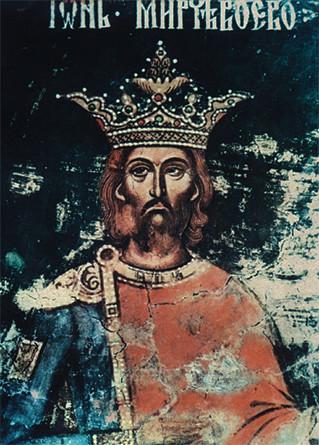emblem
contrariwise having an arrogant attitude, by claiming that “Basarab is the
shepherd of my sheep and I will take him out from his lair” (chronicle Chronicon Pictum).
Seeing there is no other way to avoid the Hungarian inroad in Walachia, Prince
Basarab the First prepared for battle, by attracting the enemy in a desired place.
The battle that followed took place in a narrow valley called Posada, lasting 3 days
between 9th and 12th November, 1330. At the end, Prince Basarab strongly crushed the
Hungarian army, the Prince Carol Robert D‟Anjou succeeding to escape alive, only by
disguising himself! This inroad of the Hungarian army in Walachia
was told in details, together with pictures and graves in a Hungarian
chronicle named “Chronicon Pictum”. The victory from Posada
signed in fact, the birth certificate of the country of Walachia,
Basarab I being the first prince in history who obtained the
independence of the country, that he called Ţara Românească (The
Romanian Country) . You have to know this is the name for this
region from present southern Romania, which forever remained
Posada Battle, Nov.1330
and always used in the Romanian history! There were also other
Picture- Chronicon Pictum
names used during the time for this territory. In the latin documents
from that time, Walachia were knew as Transalpina, meaning „the country over the
Transilvanian mountains”, - the name given by the western europeans for Meridional
7

Carpathians mountains. The other names for this country were also Walachia - called like
this especially by the germans or hungarians, and Muntenia (The Mountain Country) -
called like this by the Moldavians. Therefore, today the Romanians still use to call this
region, The Romanian Country or Mountain Country, but never call it Walachia; this is the
name used only by the foreigners! However, as this book is addressed especially to the
English readers, I will continue to call it simply, “Walachia”. Coming back to the XIII century,
the first ruler of Walachia, Prince Basarab I – named also, “Basarab The Founder” –
reorganized the administration and the country‟s army, establishing in the same time good
relationships with the neighbours, Bulgarians and Serbians. He died in 1352, after 42 years
of prosperous government, being buried inside the Monastery of Curtea de Argeş. Basarab
the First has a very important part in the romanian history, as he is the first ruler prince that
obtained the independence of Walachia, being also considered the founder of this country.
In 23 of September 1386, came to the throne of Walachia the Prince Mircea cel
Bătrân (Mircea the Elder) - the grand father of Vlad Ţepeş - one of the most important ruler
princes in the Romanian history! He successfully ruled Walachia for 32 years, until 31st of
January, 1418. His name “the Elder” does not mean he was an old man, but in
administration‟s language, meant that he was the first prince with this name who ruled the
country; in Walachia did not exist that times the practice to count the princes, as in Western
Europe. Mircea cel Bătrân took the leading of the country in a full process of its
development, grace of the wise policy of his ancestors; he continued the reforms,
consolidating the administration, economy, army and religion. He
established strong external alliances with Sigismund of
Luxembourg, King of Hungary and Petru Muşat, Prince of
Moldavia, in order to increase the chances of keeping the
country‟s independence. The three common interests were that of
defending the region against Ottoman Empire‟s expansion. Due to
he sustained the other Christian nations in their anti-ottoman
policy, Mircea the Elder has been quickly seen by the Ottomans,
as enemy. Thus, at the beginning of 1395, the Ottoman sultan
Mircea the Elder, picture




